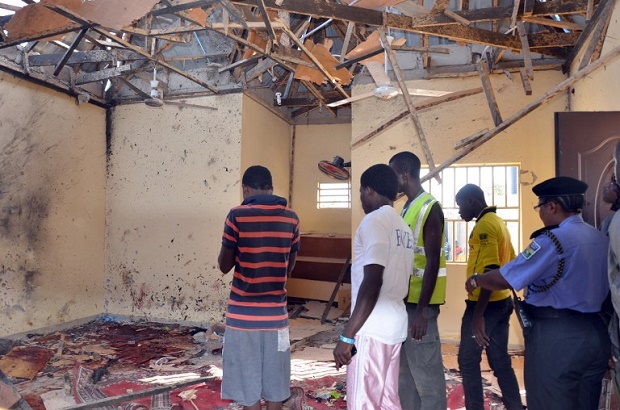Two bomb blasts ripped through mosques in northeast Nigeria on Friday, killing at least 55 people and injuring more than 100, as Boko Haram fighters briefly seized a town in neighboring Cameroon.
The attacks in Maiduguri, Yola and the Cameroonian town of Kerawa again underlined the persistent national and regional threat from the Islamist militants, despite military claims of gains.
Fears will be heightened particularly in Maiduguri, which has been hit six times this month, with a total of 76 people killed, according to an AFP tally
Questions will also again be raised about how the militants are able to carry out such attacks on a regular basis, after similar attacks in the city last month claimed 117 lives.
The bombings also demonstrated the challenges facing the United States, which last week announced the deployment of up to 300 military personnel to northern Cameroon.
The contingent will conduct surveillance and intelligence operations against Boko Haram, including within Nigeria, at a time when attacks on civilians are on the increase.
The first attack in Maiduguri happened shortly after 5:00 am (0400 GMT) in the Jidari area of the Borno state capital, where Boko Haram was founded in 2002.
Umar Sani, a civilian vigilante assisting the military in the counter-insurgency, and local resident Musa Sheriff both told AFP there were two blasts at the mosque.
“I was involved in the evacuation. We counted 28 dead bodies apart from the two bombers, who were identifiable by the mutilation of their bodies,” said Sani.
“Over 20 other people were injured.”
Nigeria’s National Emergency Management Agency (NEMA) said only six people were killed and 17 others injured, while hospital sources put the death toll at 19.
Both Sani and Sheriff said two other people were arrested and handed over to the military for questioning after they were seen apparently celebrating following the blasts.
The two men were “standing from afar, hugging each other like a celebration, chanting “Allahu Akbar” (God is greatest)”, said Sani.
“To them it was a mission accomplished,” added Sheriff.
Boko Haram, which wants to create a hardline Islamic state in northeast Nigeria, has previously targeted mosques and religious leaders who do not share their extremist ideology.
Nigeria’s President Muhammadu Buhari has given his military commanders until December to end the insurgency, which has left at least 17,000 people dead and more than 2.5 million homeless since 2009.
Packed mosque
The explosion in Yola happened at about 2:00 pm at the Jambutu Juma’at mosque in the Jimeta area of the city, shortly after the imam had finished his inaugural sermon.
At least 27 people were killed in the bomb blast at the newly-inaugurated mosque, NEMA said.
One volunteer at the Jambutu Juma’at mosque, who helped in the rescue effort but asked not to be identified, said: “This mosque was nearly built and this was the first prayers in it.
“While worshippers had risen for the prayers to start after the sermon by the imam, there was a huge blast in the premises.”
NEMA’s coordinator in the Adamawa state capital, Sa’ad Bello said that 116 people were being treated for injuries at two hospitals in the city.
Most of the injured were in a stable condition, with injuries ranging from fractures and burns to cuts from the blast, he added.
Yola has been seen as a relatively safe haven from the Boko Haram insurgency, which has ravaged the northeast for the last six years.
But fears were heightened after an explosive device went off at a camp for displaced people to the south of the city last month, killing seven people and injuring 20 more.
Town overrun
In Cameroon, regional and security sources said the rebels had briefly overrun the town of Kerawa, in the far north, and an unspecified number of civilians were killed.
“They pulled out after the troops arrived. There hasn’t been any more fighting,” a source said, while another said the Islamist group had “fled” to neighbouring Nigeria.
Kerawa, which has 50,000 inhabitants, is located in the Kolofata district that is regularly targeted by Boko Haram.
There is a military camp inside the town, which was last hit by a double suicide bombing on September 3, which claimed at least 30 lives.
Cameroon, Chad and Niger have formed a military alliance with Nigeria and Benin to battle the extremists, who this year declared allegiance to the Islamic State.
The Islamists’ grip on the region has suffered as a result of offensives launched by local armies.
But the group maintains strongholds in areas that are difficult to access, such as the Sambisa forest, the Mandara mountains and the numerous islands of Lake Chad.














